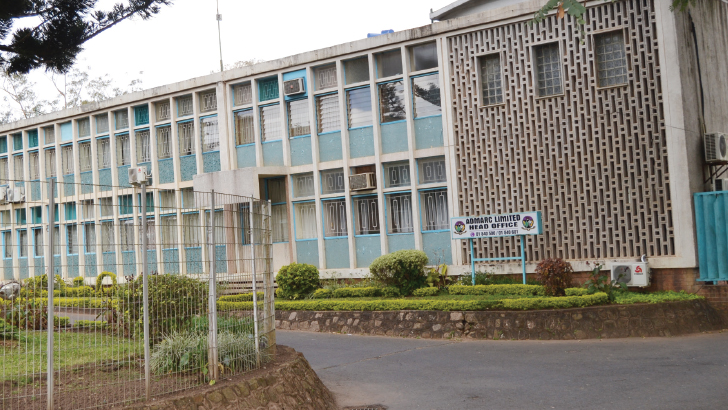Admarc state stirs AIP panic
Barely weeks before the onset of rains heralding a new farming season, experts have asked Ministry of Agriculture to expedite restructuring of Admarc to avoid crippling the economy and compromising the Affordable Inputs Programme (AIP).
Meanwhile, Parliamentary Committee on Agriculture has summoned Ministry of Agriculture to give an update on the restructuring of State produce trader Agricultural Development and Marketing Cotrporation (Admarc) which remains closed after Minister of Agriculture Lobin Lowe ordered its closure on September 1 to pave the way for the restructuring of the financially-struggling parastatal.

Besides its mandate as a stabiliser of produce prices, Admarc is also a key distributor of subsidised inputs under AIP, the Tonse Alliance administration’s flagship initiative aimed at reducing food insecurity.
Reacting to the situation at Admarc in an interview on Monday, finance and corporate governance Professor Kamwachale Khomba, who teaches at Malawi University of Science and Technology, said the suspension of operations of the country’s major grain trader could also affect the nation socially and economically.
He said: “My belief is that they made a cost-benefit analysis before coming up with the decision, otherwise it is ill-timed and it’s obvious that this will have a negative social and economic impact.
“It is my wish that they expedite the review because the sooner Admarc is back on track, the better.”
In a separate interview, agriculture policy analyst Tamani Nkhono-Mvula said closing Admarc is a crisis as its depots play a crucial role in the implementation of AIP.
“Considering that Admarc is a main actor in the execution of the AIP, there is need for key personnel, who will ensure proper planning and that all logistics are in place, to be in charge,” he said.
Parliamentary Committee on Agriculture and Food Security deputy chairperson Ulemu Chilapondwa said in an interview on Monday the committee has summoned Ministry of Agriculture to provide an update on the restructuring process.
“We want to understand why they have closed Admarc and what they feel will help resolve the challenges Admarc was facing,” he said.
But Ministry of Agriculture spokesperson Gracian Lungu on Monday allayed fears that the suspension will have a negative effect on AIP, saying government is working to resolve issues surrounding Admarc before the roll-out of this year’s AIP.
He said: “Admarc is just going through a restructuring process and its employees are available to work any time they are called to. All the issues are being resolved and if need be, we will still recall some of the officers at Admarc to assist in the AIP. We don’t expect the suspension to compromise AIP.”
However, Lungu kept under wraps the exact date when Admarc will be reopened or when the AIP will be rolled out this year.
Lowe announced the closure of the institution and that all staff were on paid leave to pave the way for the redefining of the institution’s functions.
The minister said the Tonse Alliance administration has for over two years been analysing the best ways to restructure Admarc and that the Ministry of Agriculture and the institution’s shareholders concluded that the parastatal was failing to tick to give desired results.
He attributed Admarc’s poor performance to alleged corruption among some employees, low productivity due to laziness, unprocedural recruitment leading to excessive workforce and prolonged conflicts between board of directors and management.
Barely days after the minister’s announcement, Admarc’s then board chairperson Alexander Kusamba Dzonzi told the Parliamentary Committee on Trade, Industry and Tourism that 3 122 jobs were at risk as part of the restructuring process.
He also said Admarc needed about K400 billion to implement a turnaround strategy that will see it setting up factories for value addition, among others.
Meanwhile, findings of an external audit show that Admarc has lost about K330 million to fraud and abuse masterminded by employees through bogus car insurance and medical cover claims as well as dubious staff loan scheme.
The 2021 Malawi Government Annual Economic Report shows that as at half year of the 2021/22 fiscal year, Admarc recorded a net loss-after-tax of K3.7 billion.
In January this year, Admarc appealed for a bailout to settle loans hovering around K58 billion obtained from various commercial banks which it said were hindering it from accessing finances to manage its operations.
Until 1987, Admarc was the sole buyer of smallholder produce, but in 2004, it was incorporated as a limited liability company with government owning 99 percent of the shares.
A Poverty and Social Impact Analysis on Admarc conducted by former Secretary to the Treasury Milton Kutengule alongside Antonio Nucifora and Hassan Zaman indicated that Admarc’s social functions ceased in early 2000s.
The cessation followed the establishment of National Food Reserve Agency (NFRA) and the Department of Poverty and Disaster Management Affairs, now Department of Disaster Management Affairs.
In line with the changes, Admarc’s storage capacity, which used to reach 468 000MT, was reduced to 200 000MT following the transfer of storage facilities to NFRA.
Before the reforms, Admarc operated up to 1 300 seasonal markets, 217 unit markets, 80 area offices, 12 district headquarters, three regional offices and 18 storage depots. Half of these were closed and, as of 2020, Admarc now operates 700 seasonal markets nationwide.






One Comment